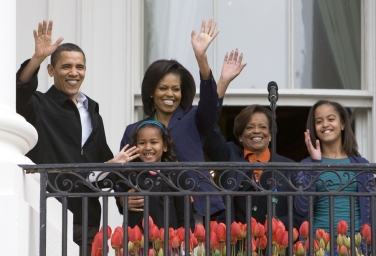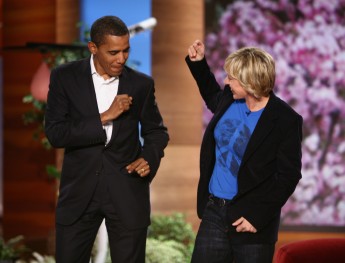Sometimes I wonder whether the world is being run by smart people who are putting us on, or by imbeciles who really mean it. – Mark Twain
I’ve listed four perspectives from which we grade Obama, beginning with the most idealistic (that is, our most idealistic – and innocent – projections) and moving toward what some might call more cynical, or realistic. Let’s continue.
Myth # 5 – No intentions whatsoever, except to survive. In this story, Obama was simply the latest in a very long line of narcissists of overweening ambition who had long ago sold their souls to serve as spokespersons and salesmen for major power interests.
To disagree with this perspective is to disagree with this one: In our broken democracy, no one is considered for serious, well-funded candidacy, least of all a Black person, without being exhaustively vetted by the power brokers. The few who slip past the gatekeepers are easily marginalized, such as Ron Paul and Dennis Kucinich, or abandoned, such as George McGovern and Bernie Sanders (as for Trump: he’ll roll over or he’ll be rolled over.) The title of this story is Survivor.
Our gatekeepers do value the continuance of society’s values, at least to the extent of perpetuating the dominance of their social class. To that goal, their searchlights always probe the graduating classes of the major universities in what amounts to the first of many stages in which promising, charismatic, energetic and extremely ambitious young men are vetted for future leadership roles. These are men who show the potential of being able to carry the “King” projections of the people. In this light, we note that shortly after college Obama worked for a firm (he doesn’t mention it by name in his autobiography) called “Business International Corporation,” which even the New York Times has acknowledged as having long-time connections to CIA covert operations.
Years later, like every president since Franklin Roosevelt except for Jimmie Carter (and Carter only as an ex-president), Obama became a master of political symbolism and rhetoric who temporarily satisfied his base supporters as a stiff drink briefly reduces an alcoholic’s fever. In an age of really crazy talk, his image emanated calmness, rationality, eloquence and intellectual curiosity tempered by sincerity, compassion and even the willingness to weep in public.
His image: He and his family held the King projections of liberals better than any president since John Kennedy. This is no small thing. 
And, unlike JFK, this King who began as a community organizer could hang with us jes’ folks: shooting jump shots, sipping beer and singing Sweet Home Chicago. He was one of us, after all!  He had both charm and genuine charisma, especially in comparison to the grey-suit country clubbers, religious hucksters and shameless bigots of the Republican Clown Car. My God, he quoted Yeats!
He had both charm and genuine charisma, especially in comparison to the grey-suit country clubbers, religious hucksters and shameless bigots of the Republican Clown Car. My God, he quoted Yeats!
He was a con-man. As Glen Ford wrote, he was consistently not the lesser but merely the “smarter” of two evils.
Mythology teaches us to look at the images as much or more than the words. In American popular culture the image is the brand, and Brand Obama was very appealing. This doesn’t mean that he pretended to be who he is; what you saw is what you got. He was so convincing (and hence so abhorrent to the Clown Car) because, like Trump, he was his brand. But it was still a brand that was created, developed and vetted to appeal to you.
Chris Hedges reminds us about branding in America:
Politicians are little more than brands. They sell skillfully manufactured personalities. These artificial personalities are used to humanize corporate oppression. They cannot—and do not intend to—end the futile and ceaseless wars, dismantle the security and surveillance state, halt the fossil fuel industry’s ecocide, curb the predatory class of bankers and international financiers, lift Americans out of poverty or restore democracy.
I pondered this subject and its mythological implications in Chapter Eight of my book:
He is…merely a new “brand,” designed to pacify the public with convincing fantasies while business continues as usual…In the eternal gentleman’s dispute within the ruling class, Wall Street’s man defeated John McCain, the candidate of Big Oil. Obama is merely the newest, more palatable face of empire, with the clear assignment to re-invigorate the myth of innocence.
His role, writes Greg Palast, is to “…soothe America’s conscience with the happy fairy tale that his election marked the end of racism in the USA.” If the more blatant forms of traditional bigotry have receded somewhat, a newer, more insidious version may have appeared. Tim Wise writes that “Racism 2.0” allows whites to celebrate the achievements of certain acceptable, non-threatening individuals such as Obama who have “transcended their blackness,” while continuing to fear and discriminate against the great majority of blacks, reds and browns…
But I was willing to entertain other possibilities:
Perhaps his election does represent a change in consciousness…“It’s not that Obama is the change,” writes Michael Ventura, “…it’s that his election is an expression of decades of painful, difficult, incremental changes…A paradox consists of at least two aspects that are opposite yet equally true…It is equally true that Obama inspired his way into the Oval Office and that he bought it. Obama won by the power of a paradox, and his administration, for good and for ill, will be a paradox of power…Perhaps only the language of paradox will work to facilitate the breakdown of a crust so hardened as American myth.”…In the short run, that myth has actually been strengthened by the philosophy of “Yes we can.” Only in America (we are told) could such a mixed-race person rise so high from such humble beginnings. The story is so familiar: an exceptionally extraordinary man – the Hero – comes out of nowhere and takes power in a dangerous time.
And I offered what turned out to be an accurate prediction of the next few years:
…hope taken to the extreme can make people inappropriately dependent on specific individuals, rather than on their own capabilities. The risk of pursuing a philosophy of inclusion in a madhouse is that it may easily evoke its shadow of disillusionment, deflation and further disengagement when things go wrong…
I also wrote,
In his defense, we must note that seven former godfathers of a fifty billion dollar crime syndicate known for assassinating public figures – the CIA – very publicly warned him not to probe too deeply into allegations of prisoner abuse by that same gang. It was, perhaps, a declaration of just who is really in charge to a man who receives over thirty death threats per day.
Obama was anything but stupid, and he was perfectly well aware that, when shortly after the Bay of Pigs fiasco John Kennedy said that he wished he could “splinter the CIA into a thousand pieces and scatter it into the winds,” he had signed his own death warrant. In 2012 Ray McGovern described a meeting Obama took with some disappointed liberal supporters:
And I know from a good friend who was there when it happened…Why don’t you do the things we thought you stood for? Obama turned sharply and said, “Don’t you remember what happened to Martin Luther King Jr.?” That’s a quote, and that’s a very revealing quote.
Advertisements